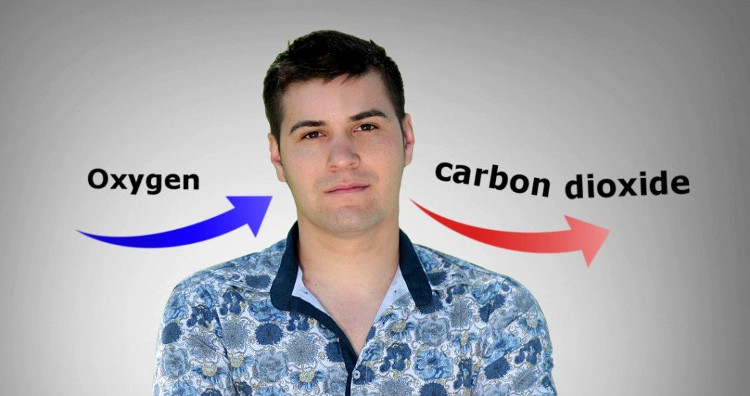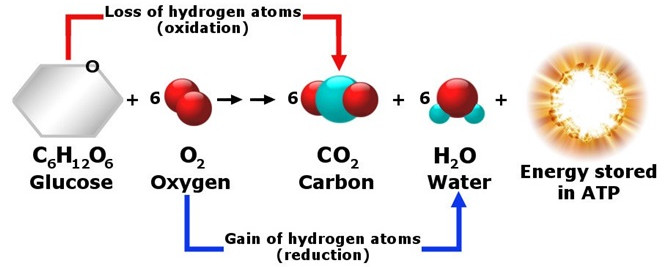Why do we breathe out carbon dioxide?
Have you ever wondered why our body releases carbon dioxide (CO2) when breathing, not another gas?
This is the basic knowledge that almost everyone learns from childhood: inhale oxygen and breathe out carbon dioxide. However, have you ever wondered why your body releases carbon dioxide?
Why do we breathe out carbon dioxide?

Carbon dioxide is a waste product of metabolism and biochemistry.
Carbon dioxide produced in the body is the result of the process of respiratory cells - where important nutrients are converted into energy in the presence of oxygen. Carbon dioxide is produced and then removed from the body by dissolving in the blood and through binding to hemoglobin to be transported to the lungs - where it is pushed into the environment through the nose and mouth.
How is carbon dioxide produced in our body?
Carbon dioxide is a wasteful product of metabolism and biochemistry that occurs inside our bodies.
Cellular respiration
Talking about breathing, the first thing people think about is the nose and lungs. Below is a diagram of the entire respiratory process that we often learn in high schools.

Respiratory cells are not what you can see in this picture.
However, cellular respiration is not what you can see in the picture above. As the name suggests, it takes place at the cellular level in our bodies. More specifically, it is a series of metabolic processes and reactions within the cell that convert biochemical energy derived from important nutrients into a source of energy to provide fuel for the cell.
Although many biochemical reactions take place continuously in the body, most of the energy supplied to the body is metabolized from within the cell. The substances involved in this reaction are mainly sugars, carbohydrates, fats, proteins and it takes place in the presence of oxygen. This is called aerobic respiration.

This biochemical reaction occurs inside our body cells and produces carbon dioxide as a byproduct.
This biochemical reaction occurs inside our body cells and produces carbon dioxide as a byproduct. Glucose, fat and protein are both used as fuel sources for this reaction. In this process, the ratio of carbon dioxide produced less than the amount of oxygen we consume.
How is carbon dioxide excreted from the body?
We all know that high levels of carbon dioxide can harm our bodies. Therefore it must be excreted from the body.
This is done through three major biological processes: carbon dioxide molecules are directly dissolved into the blood , they bind to proteins (especially hemoglobin in the blood) or exist as water as carbonic acid ( part of bicarbonate buffer system). The scope of this article mainly focuses on the first process.
Carbon dioxide is more soluble in blood than oxygen

Carbon dioxide dissolves in human blood more than oxygen.
Due to some chemical properties of carbon dioxide, it dissolves in human blood more than oxygen. Soluble carbon dioxide is carried to the lungs, alveoli, separated from the blood and pushed out of the body through the nose and mouth.
Carbon dioxide binds to hemoglobin
Carbon dioxide molecules can penetrate red blood cells and bind to hemoglobin - a protein present in the transport of oxygen in the blood throughout the body.

Carbaminohemoglobin molecules form when carbon dioxide binds to hemoglobin.
A molecule is named carbaminohemoglobin formed when carbon dioxide binds to hemoglobin. It accounts for 30% of the total carbon dioxide in the human body. The binding between emoglobin and carbon dioxide is a reversible process, carbon dioxide molecules are separated from hemoglobin when moving to the lungs. Once again, gas exchange takes place in the alveoli: receiving oxygen and separating carbon dioxide from the blood, eventually pushing the strain out of the body through the nose, mouth (exhalation).

60% of carbon dioxide in the body exists in the form of bicarbonate ions.
60% of carbon dioxide in the body exists in the form of ionic bicarbonate (hydrogen carbonate) - helps maintain blood pH and supports other metabolic activities.
In short, we release carbon dioxide from the body when breathing. They are produced in cells that help break down food when we eat and convert it into energy that helps the body maintain living activities.
- Find out how to 'recycle' carbon dioxide into plastic
- Switzerland operates the plant
- Publish carbon dioxide data in oceans
- Risks from carbon dioxide in the next millennium
- Mice use specialized neurons to detect carbon dioxide in the air
- The material has the ability to 'capture' carbon dioxite and turn it into organic matter
- How does plants 'breathe'?
- Cure allergies with carbon dioxide
- Proposing 'paradoxical': Discharging more CO2 can limit climate change
- Norway spends nearly 4 million USD researching sea CO2 storage
- Elevated carbon dioxide makes the ear bones unusually large
- Ants can play the role of 'savior'
 'Fine laughs' - Scary and painful torture in ancient times
'Fine laughs' - Scary and painful torture in ancient times The sequence of numbers 142857 of the Egyptian pyramids is known as the strangest number in the world - Why?
The sequence of numbers 142857 of the Egyptian pyramids is known as the strangest number in the world - Why? History of the iron
History of the iron What is alum?
What is alum?